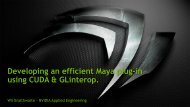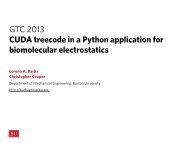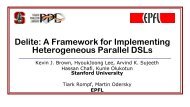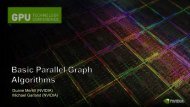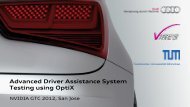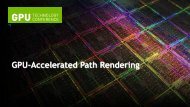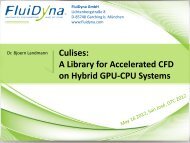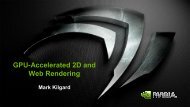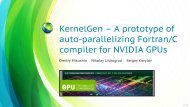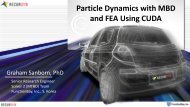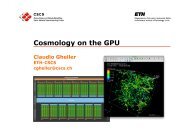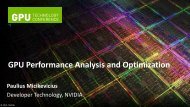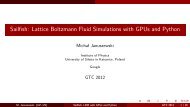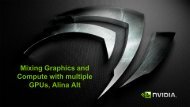GTC 2012 Program Guide - GPU Technology Conference
GTC 2012 Program Guide - GPU Technology Conference
GTC 2012 Program Guide - GPU Technology Conference
Create successful ePaper yourself
Turn your PDF publications into a flip-book with our unique Google optimized e-Paper software.
TUESDAY<br />
from measurements. The simulations involving multiplications<br />
and inversions of large matrices provide an ideal showcase for<br />
performance gain by employing GP<strong>GPU</strong>s in the execution of the<br />
algebraic routines on these matrices in computing environments<br />
with shared execution of algorithms on multiple nodes with<br />
multiple GP<strong>GPU</strong>s and CPU cores.<br />
Speaker(s): Jan Jacob (Postdoctoral Researcher, University of Hamburg)<br />
Topic(s): General Interest, Computational Physics, Application Design<br />
& Porting Techniques (Intermediate)<br />
TUESDAY, MAY 15, 14:30 (50 MINUTES)<br />
ROOM K<br />
S0516 The Advantage of <strong>GPU</strong> Computation for Analyzing<br />
Complex Traits<br />
Most import agriculture traits and human diseases are complex<br />
traits which are controlled by gene network with gene by gene<br />
interaction (epistasis) and gene by environment interaction (GE).<br />
New statistic methods and software are developed for analyzing<br />
genetic architecture for complex traits based on genome-wide<br />
association study (GWAS). When deal with large mapping<br />
population and huge amount of molecular information, <strong>GPU</strong><br />
computation has an advantage over CPU computation. We will<br />
demonstrate the newly developed <strong>GPU</strong> based software<br />
QTLNetwork V3.0 and GWAS-GMDR for mapping genes with<br />
epistasis and GE interaction for complex traits of human, crops,<br />
and mouse.<br />
Speaker(s): Jun Zhu (Professor, Zhejiang University)<br />
Topic(s): Bioinformatics, Life Sciences (Intermediate)<br />
TUESDAY, MAY 15, 14:30 (25 MINUTES)<br />
ROOM B<br />
S0610 Octree-Based Sparse Voxelization For Real-Time<br />
Global Illumination<br />
Discrete voxel representations are generating growing interest in<br />
a wide range of applications in computational sciences and<br />
particularly in computer graphics. A new real-time usage of<br />
dynamic voxelization inside a sparse voxel octree is to compute<br />
voxel-based global illumination. When used in real-time contexts,<br />
it becomes critical to achieve fast 3D scan conversion (also called<br />
voxelization) of traditional triangle-based surface representations.<br />
This talk describes an new surface voxelization algorithm that<br />
produces a sparse voxel representation of a triangle mesh scene<br />
in the form of an octree structure using the <strong>GPU</strong> hardware<br />
rasterizer. In order to scale to very large scenes, our approach<br />
avoids relying on an intermediate full regular grid to build the<br />
structure and constructs the octree directly.<br />
Speaker(s): Cyril Crassin (Postdoctoral Research Scientist, NVIDIA)<br />
Topic(s): Computer Graphics (Intermediate)<br />
TUESDAY, MAY 15, 14:30 (25 MINUTES)<br />
ROOM A2<br />
S0655 Direct Numerical Simulation of Turbulence-<br />
Chemistry Interactions: Fundamental Insights Towards<br />
Predictive Models<br />
Recent petascale direct numerical simulation (DNS) of turbulent<br />
combustion have transformed our ability to interrogate finegrained<br />
‘turbulence-chemistry’ interactions in canonical<br />
laboratory configurations. In particular, three-dimensional DNS,<br />
at moderate Reynolds numbers and with complex chemistry, is<br />
providing unprecedented levels of detail to understand<br />
fundamental coupling between turbulence, mixing and reaction.<br />
This information is leading to new physical insight and is providing<br />
unique validation data for assessing model assumptions in<br />
coarse-grained engineering CFD approaches used to design<br />
modern combustors. The role of petascale DNS is illustrated<br />
through selected examples relevant to controlling ignition and<br />
combustion rates in homogeneous charge compression ignition<br />
engines and to fuel injection processes in stationary gas turbines<br />
for power generation. Petascale simulations presently generate<br />
upwards of a petabyte of complex, multi-scale, time-varying data<br />
used by combustion modelers to validate subfilter combustion and<br />
mixing models in large-eddy simulation. With the advent of 10-20<br />
petaflop hybrid architectures with accelerators like Titan at Oak<br />
Ridge National Laboratory, it will be possible to dramatically<br />
increase the chemical complexity of DNS. This will help accelerate<br />
the development of predictive subprocess models which will be<br />
used by engine developers to better understand and tailor the<br />
combustion of gasoline and new, more complex types of fuels in<br />
advanced engines. With Titan, simulations will move beyond<br />
today’s studies of simple fuels—hydrogen, syngas and methane—<br />
to more complex, larger-molecule hydrocarbon fuels like<br />
isooctane (a surrogate for gasoline), commercially important<br />
oxygenated alcohols (for example, ethanol and butanol), and<br />
biofuel surrogates.<br />
Speaker(s): Jacqueline H. Chen (Combustion Research Facility, Sandia<br />
National Laboratories)<br />
Topic(s): Supercomputing (Intermediate)<br />
TUESDAY, MAY 15, 15:00 (50 MINUTES)<br />
ROOM L<br />
S0034 Real-Time Risk Simulation: The <strong>GPU</strong> Revolution In<br />
Profit Margin Analysis<br />
Discover how ICHEC helped a world leading company in its sector,<br />
to dramatically speed-up and improve the quality of its real-time<br />
risk management tool chain. In this session, we present the<br />
method used for porting the core-part of the simulation engines<br />
to <strong>GPU</strong>s using CUDA. This porting was realized on two very<br />
different simulation algorithms and resulted in speed-ups of 2 to<br />
3 orders of magnitude, allowing much greater accuracy of the<br />
results in a real-time environment.<br />
Speaker(s): Gilles Civario (Senior Software Architect, ICHEC), Renato<br />
Miceli (Computational Scientist, ICHEC)<br />
Topic(s): Finance, Application Design & Porting Techniques, Algorithms<br />
& Numerical Techniques (Intermediate)<br />
TUESDAY, MAY 15, 15:00 (50 MINUTES)<br />
ROOM C<br />
S0036 Multiparticle Collision Dynamics on <strong>GPU</strong>s<br />
See how we employ <strong>GPU</strong>s to simulate the interaction of millions of<br />
solvent and solute particles of a fluid system. Often the domain of<br />
large cluster system, the most time consuming part of our<br />
simulations can now be done on desktop PCs in reasonable time.<br />
This contribution shows how <strong>GPU</strong>s can effectively be used to<br />
accelerate existing programs and how techniques like streaming<br />
and increased data locality significantly enhance calculation<br />
throughput. It also shows how a <strong>GPU</strong>-optimized program<br />
structure yields usually expensive additional functionality “almost<br />
free”. Furthermore, a well-scaling single-node/multi-<strong>GPU</strong><br />
implementation of the program is presented.<br />
Speaker(s): Elmar Westphal (Software Developer,<br />
Forschungszentrum Juelich)<br />
Topic(s): Computational Physics, Computational Fluid Dynamics,<br />
Molecular Dynamics (Intermediate)



